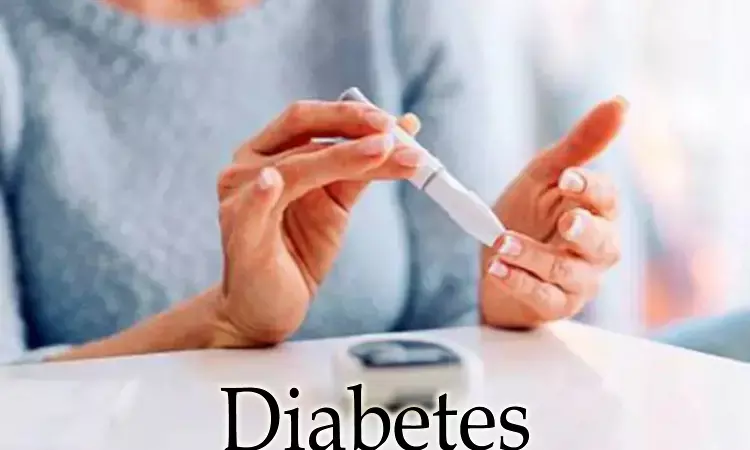- Home
- Medical news & Guidelines
- Anesthesiology
- Cardiology and CTVS
- Critical Care
- Dentistry
- Dermatology
- Diabetes and Endocrinology
- ENT
- Gastroenterology
- Medicine
- Nephrology
- Neurology
- Obstretics-Gynaecology
- Oncology
- Ophthalmology
- Orthopaedics
- Pediatrics-Neonatology
- Psychiatry
- Pulmonology
- Radiology
- Surgery
- Urology
- Laboratory Medicine
- Diet
- Nursing
- Paramedical
- Physiotherapy
- Health news
- Fact Check
- Bone Health Fact Check
- Brain Health Fact Check
- Cancer Related Fact Check
- Child Care Fact Check
- Dental and oral health fact check
- Diabetes and metabolic health fact check
- Diet and Nutrition Fact Check
- Eye and ENT Care Fact Check
- Fitness fact check
- Gut health fact check
- Heart health fact check
- Kidney health fact check
- Medical education fact check
- Men's health fact check
- Respiratory fact check
- Skin and hair care fact check
- Vaccine and Immunization fact check
- Women's health fact check
- AYUSH
- State News
- Andaman and Nicobar Islands
- Andhra Pradesh
- Arunachal Pradesh
- Assam
- Bihar
- Chandigarh
- Chattisgarh
- Dadra and Nagar Haveli
- Daman and Diu
- Delhi
- Goa
- Gujarat
- Haryana
- Himachal Pradesh
- Jammu & Kashmir
- Jharkhand
- Karnataka
- Kerala
- Ladakh
- Lakshadweep
- Madhya Pradesh
- Maharashtra
- Manipur
- Meghalaya
- Mizoram
- Nagaland
- Odisha
- Puducherry
- Punjab
- Rajasthan
- Sikkim
- Tamil Nadu
- Telangana
- Tripura
- Uttar Pradesh
- Uttrakhand
- West Bengal
- Medical Education
- Industry
Lower anti-Mullerian hormone levels tied to higher diabetes risk in women: Study

Netherlands: Lower levels of age-specific anti-Mullerian hormone (AMH) is associated with a higher risk of type 2 diabetes (T2D) in women, reveals a recent study in the journal Diabetologia.
Circulating levels of AMH is considered as a marker of reproductive ageing, given its role in the development of ovarian follicle. Accelerated reproductive ageing has been shown to be associated with a higher risk of type 2 diabetes. There is a scarcity of research on the relationship between AMH and type 2 diabetes. N. Charlotte Onland-Moret, Utrecht University, Utrecht, the Netherlands, and colleagues, therefore, aimed to investigate whether age-specific AMH levels and age-related AMH trajectories are associated with T2D risk in women.
For the purpose, the researchers measured AMH in repeated plasma samples from 3293 female participants (aged 20–59 years at recruitment) from the Doetinchem Cohort Study -- a longitudinal study with follow-up visits every 5 years. Age-specific AMH tertiles were calculated at baseline to account for the strong AMH–age correlation. The association between baseline age-specific AMH tertiles and incident type 2 diabetes were assessed using Cox proportional hazards models adjusted for confounders.
Key findings of the study include:
- During a median follow-up of 20 years, 163 women developed type 2 diabetes.
- Lower baseline age-specific AMH levels were associated with a higher type 2 diabetes risk (HRT2vsT3 1.24; HRT1vsT3 1.62).
- These findings seem to be supported by predicted AMH trajectories, which suggested that plasma AMH levels were lower at younger ages in women who developed type 2 diabetes compared with women who did not.
- The trajectories also suggested that AMH levels declined at a slower rate in women who developed type 2 diabetes, although differences in trajectories were not statistically significant.
"Longitudinal analyses did not demonstrate clear evidence of different AMH trajectories between women who developed T2D versus women who did not, possibly because of underpowering of these analyses," wrote the authors.
"Further research is needed to investigate whether AMH is part of the biological mechanism explaining the association between reproductive ageing and type 2 diabetes," they concluded.
Reference:
The study titled, "Anti-Müllerian hormone levels and risk of type 2 diabetes in women," is published in the journal Diabetologia.
DOI: https://link.springer.com/article/10.1007/s00125-020-05302-5
Dr Kamal Kant Kohli-MBBS, DTCD- a chest specialist with more than 30 years of practice and a flair for writing clinical articles, Dr Kamal Kant Kohli joined Medical Dialogues as a Chief Editor of Medical News. Besides writing articles, as an editor, he proofreads and verifies all the medical content published on Medical Dialogues including those coming from journals, studies,medical conferences,guidelines etc. Email: drkohli@medicaldialogues.in. Contact no. 011-43720751


